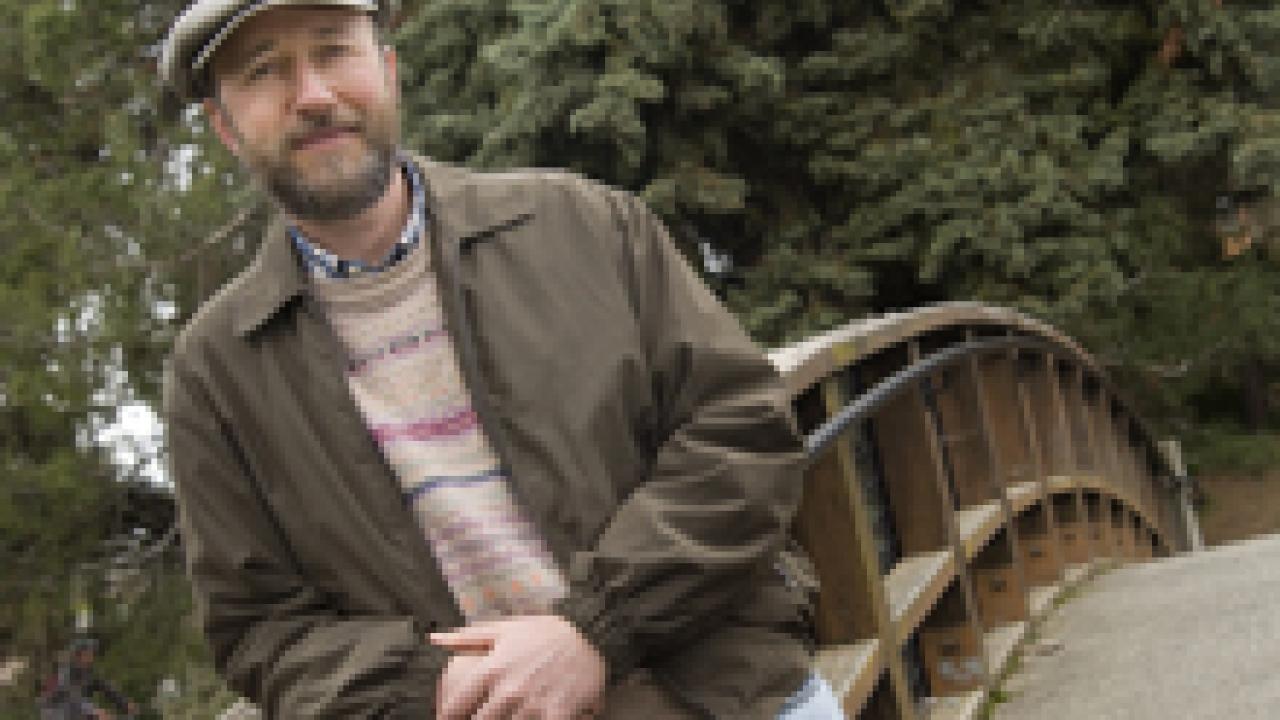Alex Mogilner’s attitude toward life was forged by his childhood in the Soviet Union. In a merciless culture of suspicion and competition, children had a particularly difficult time, explained the UC Davis professor of math and neurobiology.
“It was a brutal system. Nobody tried to think about kids as people. There was constant humiliation, a kind of hazing,” he said. “For a weaker person, it was a complete disaster.”
Fortunately for Mogilner, the experience served to toughen him up, rather than break him down. In the competitive world of academia, a thick skin has its advantages. “Criticism rolls off me like water off a duck’s back,” he claims, with a hint of amusement.
Creative collaborations
Since leaving the Soviet Union in 1990 shortly after its doors began to creak open, Mogilner has drawn on his mettle, time and again, as he obtained a second Ph.D.; switched careers; established unique collaborations between mathematicians and cell biologists; published a number of ground-breaking papers on spindle formation in cell nuclei during mitosis, and on cells that propel themselves hither and yon; traveled to remote parts of the world … and been mugged at knife point in Mexico City.
It was a part of town any sensible tourist would have avoided. But, said Mogilner, the thought never crossed his mind that he had meandered into a danger zone. “On the streets in Russia, you feel this kind of constant predatory attention,” he explained. “So after that, it’s hard to be really afraid of anything else.”
While life was hard in the Soviet Union for the common person, it was even worse for people like Mogilner who had the word “Jew” stamped on the “ethnicity” line of the official ID card all citizens were required to carry. The designation essentially barred him from many professions.
“Jewish kids were steered to a certain number of occupations,” he said. “If you did well at school, you went into science. When I was growing up in the 70s, there was still this aura of nuclear reactors and the bomb, so lots of Jewish kids went into physics.”
Mogilner felt the nudge, too, and obtained a Ph.D. in physics in 1990 at the Ural Division of the Academy of Sciences in his hometown, the industrial city of Ekaterinburg, which had been renamed Sverdlovsk during the Soviet era.
‘Travel bum’
But it took less than two years working as a postdoc in physics at the University of Manitoba to realize that the career he had been prodded into was, for him, a scientific dead end. Biology was a much stronger draw, so when he found a graduate program that combined math and biology at the University of British Columbia in Vancouver, he knew he’d found his calling.
After earning a Ph.D. in his new field in 1995, he spent a year at UC Berkeley working with the prominent biophysicist George Oster. In 1996, he joined the faculty of the math department at UC Davis, and, six years later, not content to simply settle down, he spread his academic wings even further with a second appointment, in neurobiology, physiology and behavior.
These days he defines what he’s doing as “computational biology,” mixing together physics, math, biology and chemistry to explore such puzzles as to how and why the cells that are liberated from a fish’s scales when the animal’s skin is cut start to move very fast, maintaining constant speed and a constant shape.
Apart from science, Mogilner’s great passion in life is travel, and the more remote the destination the better.
“I like to be a bum when I travel,” he said. “I go anywhere, whether it’s dangerous or not, comfortable or not. In Tibet, I basically slept with animals in their shelters. Sometimes it’s very cold, sometimes it’s very hot. The food is awful.”
Tucked away at the very bottom of Mogilner’s home page — www.math.ucdavis.edu/~mogilner — is this quiet assertion: “What I like to do is travel the world.” Click on the link for a gallery of stunning photos he has taken in Tibet, India, Brazil and a host of other countries.
Where haven’t you been yet that you’d really like to visit?
I’d like to go to southern India, to Kerala. It has a very interesting jungle, which is flooded almost all year long. Also, I’d like to go to Patagonia.
What do you like most about your job as a professor?
To be able to think really hard and long about puzzles of nature — and to be able to solve them. It’s hard for me to imagine any other activity for which I can get paid and have so much fun.
What do you like least about it?
All of the stuff that goes along with being faculty. Dealing with egos. Organizing meetings … just trying to get people to answer their e-mails.
Do you have a guilty pleasure?
That’s easy. I’m a movie buff. I watch so many of them that I feel kind of guilty — a lot of them are just no good. But it’s a great way to switch off before I go to sleep.
Read any good books lately?
I was reading a History of Western Philosophy by Bertrand Russell and was just blown away by how lucid it was. I always thought philosophy would be dense and impenetrable. There’s also an author who I recommend to anyone who asks: a Russian, Victor Pelevin. He writes a kind of science fiction, or maybe it could be called fantastic reality.
Where are you going next?
In August, I’ll be teaching a math course in Laos. I’m looking forward to working with the students there. They know what it’s like to wade in a field behind a water buffalo, up to their knees in mud, so they study hard and do not complain.
Media Resources
Clifton B. Parker, Dateline, (530) 752-1932, cparker@ucdavis.edu
